Leadership and Management in Service Industries: Thomas Cook Report
VerifiedAdded on 2022/12/27
|14
|4020
|54
Report
AI Summary
This report delves into the crucial aspects of leadership and management within the service industry, particularly focusing on the tourism and hospitality sector, with Thomas Cook as a case study. It examines classical management theories like scientific and behavioral management, analyzing their application and impact. The report explores leadership styles such as contingency and transformational leadership, recommending transformational leadership for its effectiveness in fostering innovation and employee development. It further investigates the influence of internal and external factors, including financial resources, competition, and economic scenarios, on management styles and organizational structure. The report also differentiates between hard and soft skills essential for management and leadership, providing insights into the skills required for future success in the hospitality sector. The report analyzes the leadership and management styles in the service sector, providing a detailed overview of the content.
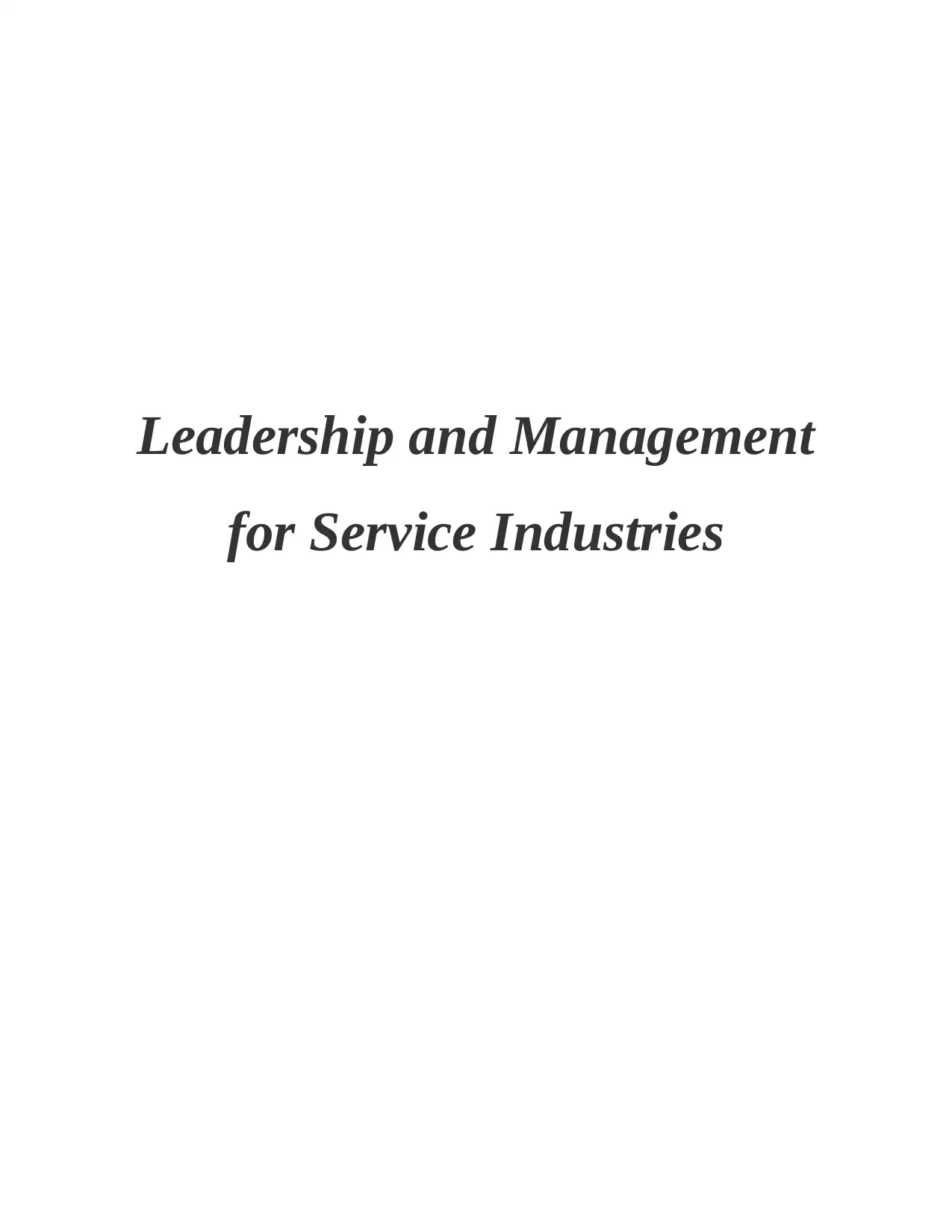
Leadership and Management
for Service Industries
for Service Industries
Paraphrase This Document
Need a fresh take? Get an instant paraphrase of this document with our AI Paraphraser
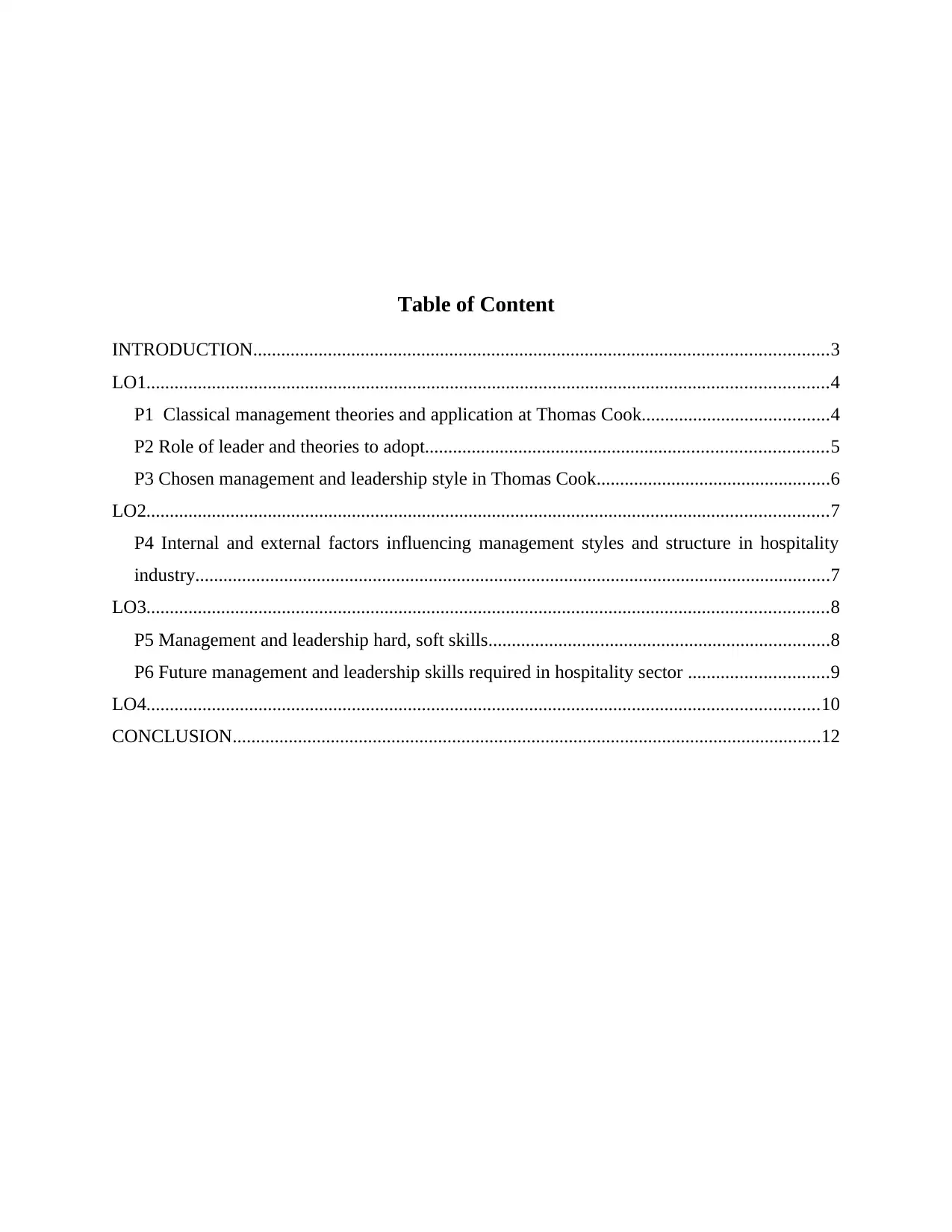
Table of Content
INTRODUCTION...........................................................................................................................3
LO1..................................................................................................................................................4
P1 Classical management theories and application at Thomas Cook........................................4
P2 Role of leader and theories to adopt......................................................................................5
P3 Chosen management and leadership style in Thomas Cook..................................................6
LO2..................................................................................................................................................7
P4 Internal and external factors influencing management styles and structure in hospitality
industry........................................................................................................................................7
LO3..................................................................................................................................................8
P5 Management and leadership hard, soft skills.........................................................................8
P6 Future management and leadership skills required in hospitality sector ..............................9
LO4................................................................................................................................................10
CONCLUSION..............................................................................................................................12
INTRODUCTION...........................................................................................................................3
LO1..................................................................................................................................................4
P1 Classical management theories and application at Thomas Cook........................................4
P2 Role of leader and theories to adopt......................................................................................5
P3 Chosen management and leadership style in Thomas Cook..................................................6
LO2..................................................................................................................................................7
P4 Internal and external factors influencing management styles and structure in hospitality
industry........................................................................................................................................7
LO3..................................................................................................................................................8
P5 Management and leadership hard, soft skills.........................................................................8
P6 Future management and leadership skills required in hospitality sector ..............................9
LO4................................................................................................................................................10
CONCLUSION..............................................................................................................................12
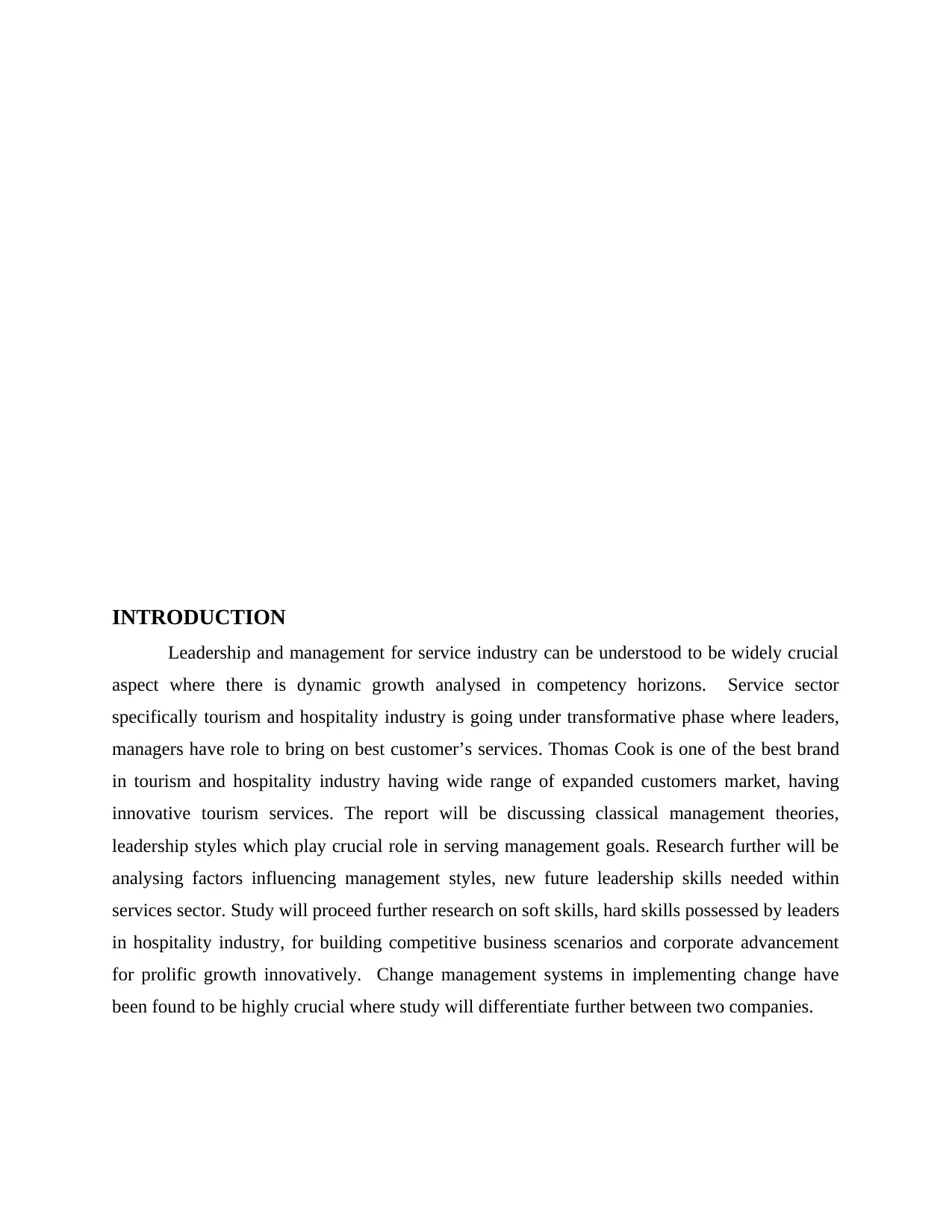
INTRODUCTION
Leadership and management for service industry can be understood to be widely crucial
aspect where there is dynamic growth analysed in competency horizons. Service sector
specifically tourism and hospitality industry is going under transformative phase where leaders,
managers have role to bring on best customer’s services. Thomas Cook is one of the best brand
in tourism and hospitality industry having wide range of expanded customers market, having
innovative tourism services. The report will be discussing classical management theories,
leadership styles which play crucial role in serving management goals. Research further will be
analysing factors influencing management styles, new future leadership skills needed within
services sector. Study will proceed further research on soft skills, hard skills possessed by leaders
in hospitality industry, for building competitive business scenarios and corporate advancement
for prolific growth innovatively. Change management systems in implementing change have
been found to be highly crucial where study will differentiate further between two companies.
Leadership and management for service industry can be understood to be widely crucial
aspect where there is dynamic growth analysed in competency horizons. Service sector
specifically tourism and hospitality industry is going under transformative phase where leaders,
managers have role to bring on best customer’s services. Thomas Cook is one of the best brand
in tourism and hospitality industry having wide range of expanded customers market, having
innovative tourism services. The report will be discussing classical management theories,
leadership styles which play crucial role in serving management goals. Research further will be
analysing factors influencing management styles, new future leadership skills needed within
services sector. Study will proceed further research on soft skills, hard skills possessed by leaders
in hospitality industry, for building competitive business scenarios and corporate advancement
for prolific growth innovatively. Change management systems in implementing change have
been found to be highly crucial where study will differentiate further between two companies.
⊘ This is a preview!⊘
Do you want full access?
Subscribe today to unlock all pages.

Trusted by 1+ million students worldwide
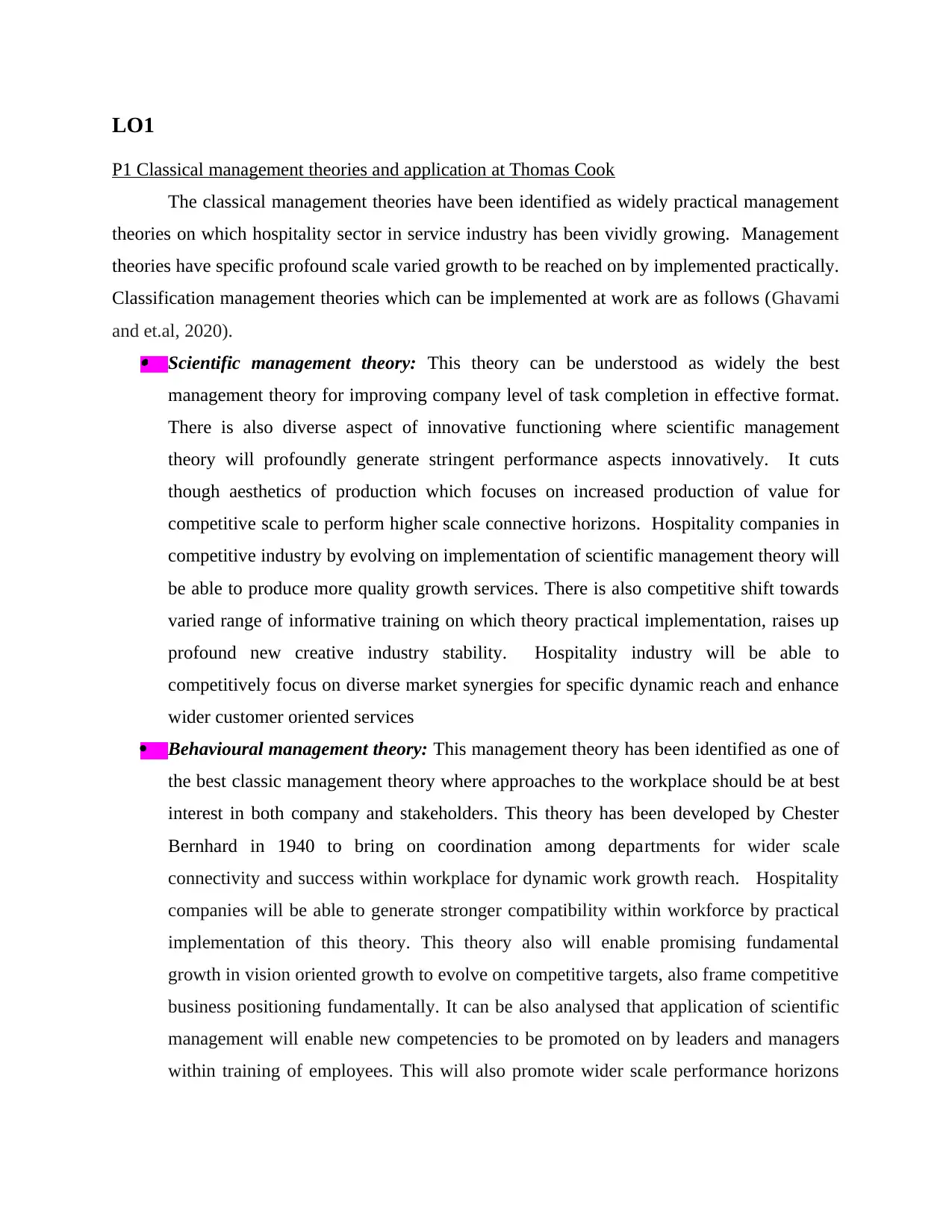
LO1
P1 Classical management theories and application at Thomas Cook
The classical management theories have been identified as widely practical management
theories on which hospitality sector in service industry has been vividly growing. Management
theories have specific profound scale varied growth to be reached on by implemented practically.
Classification management theories which can be implemented at work are as follows (Ghavami
and et.al, 2020). Scientific management theory: This theory can be understood as widely the best
management theory for improving company level of task completion in effective format.
There is also diverse aspect of innovative functioning where scientific management
theory will profoundly generate stringent performance aspects innovatively. It cuts
though aesthetics of production which focuses on increased production of value for
competitive scale to perform higher scale connective horizons. Hospitality companies in
competitive industry by evolving on implementation of scientific management theory will
be able to produce more quality growth services. There is also competitive shift towards
varied range of informative training on which theory practical implementation, raises up
profound new creative industry stability. Hospitality industry will be able to
competitively focus on diverse market synergies for specific dynamic reach and enhance
wider customer oriented services
Behavioural management theory: This management theory has been identified as one of
the best classic management theory where approaches to the workplace should be at best
interest in both company and stakeholders. This theory has been developed by Chester
Bernhard in 1940 to bring on coordination among departments for wider scale
connectivity and success within workplace for dynamic work growth reach. Hospitality
companies will be able to generate stronger compatibility within workforce by practical
implementation of this theory. This theory also will enable promising fundamental
growth in vision oriented growth to evolve on competitive targets, also frame competitive
business positioning fundamentally. It can be also analysed that application of scientific
management will enable new competencies to be promoted on by leaders and managers
within training of employees. This will also promote wider scale performance horizons
P1 Classical management theories and application at Thomas Cook
The classical management theories have been identified as widely practical management
theories on which hospitality sector in service industry has been vividly growing. Management
theories have specific profound scale varied growth to be reached on by implemented practically.
Classification management theories which can be implemented at work are as follows (Ghavami
and et.al, 2020). Scientific management theory: This theory can be understood as widely the best
management theory for improving company level of task completion in effective format.
There is also diverse aspect of innovative functioning where scientific management
theory will profoundly generate stringent performance aspects innovatively. It cuts
though aesthetics of production which focuses on increased production of value for
competitive scale to perform higher scale connective horizons. Hospitality companies in
competitive industry by evolving on implementation of scientific management theory will
be able to produce more quality growth services. There is also competitive shift towards
varied range of informative training on which theory practical implementation, raises up
profound new creative industry stability. Hospitality industry will be able to
competitively focus on diverse market synergies for specific dynamic reach and enhance
wider customer oriented services
Behavioural management theory: This management theory has been identified as one of
the best classic management theory where approaches to the workplace should be at best
interest in both company and stakeholders. This theory has been developed by Chester
Bernhard in 1940 to bring on coordination among departments for wider scale
connectivity and success within workplace for dynamic work growth reach. Hospitality
companies will be able to generate stronger compatibility within workforce by practical
implementation of this theory. This theory also will enable promising fundamental
growth in vision oriented growth to evolve on competitive targets, also frame competitive
business positioning fundamentally. It can be also analysed that application of scientific
management will enable new competencies to be promoted on by leaders and managers
within training of employees. This will also promote wider scale performance horizons
Paraphrase This Document
Need a fresh take? Get an instant paraphrase of this document with our AI Paraphraser
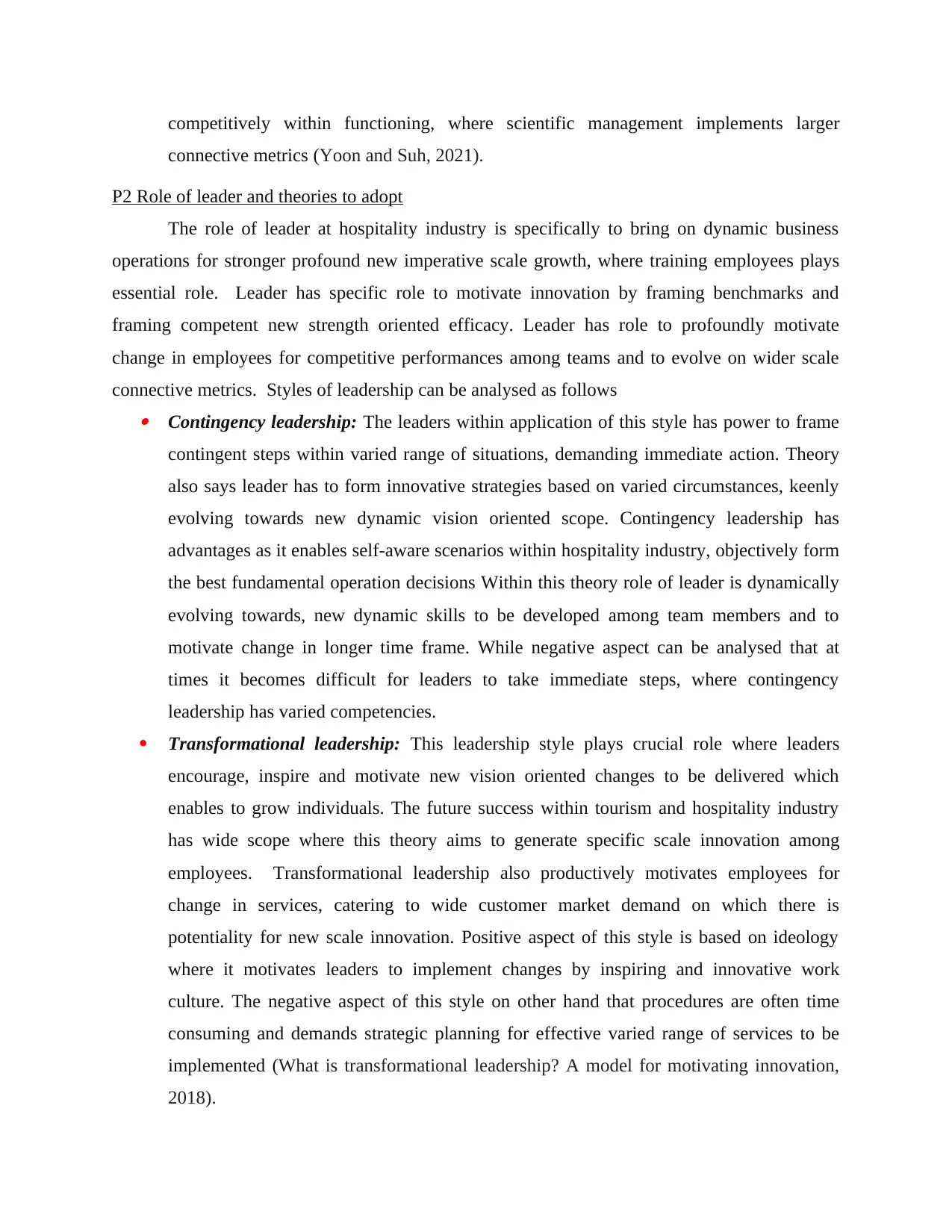
competitively within functioning, where scientific management implements larger
connective metrics (Yoon and Suh, 2021).
P2 Role of leader and theories to adopt
The role of leader at hospitality industry is specifically to bring on dynamic business
operations for stronger profound new imperative scale growth, where training employees plays
essential role. Leader has specific role to motivate innovation by framing benchmarks and
framing competent new strength oriented efficacy. Leader has role to profoundly motivate
change in employees for competitive performances among teams and to evolve on wider scale
connective metrics. Styles of leadership can be analysed as follows Contingency leadership: The leaders within application of this style has power to frame
contingent steps within varied range of situations, demanding immediate action. Theory
also says leader has to form innovative strategies based on varied circumstances, keenly
evolving towards new dynamic vision oriented scope. Contingency leadership has
advantages as it enables self-aware scenarios within hospitality industry, objectively form
the best fundamental operation decisions Within this theory role of leader is dynamically
evolving towards, new dynamic skills to be developed among team members and to
motivate change in longer time frame. While negative aspect can be analysed that at
times it becomes difficult for leaders to take immediate steps, where contingency
leadership has varied competencies.
Transformational leadership: This leadership style plays crucial role where leaders
encourage, inspire and motivate new vision oriented changes to be delivered which
enables to grow individuals. The future success within tourism and hospitality industry
has wide scope where this theory aims to generate specific scale innovation among
employees. Transformational leadership also productively motivates employees for
change in services, catering to wide customer market demand on which there is
potentiality for new scale innovation. Positive aspect of this style is based on ideology
where it motivates leaders to implement changes by inspiring and innovative work
culture. The negative aspect of this style on other hand that procedures are often time
consuming and demands strategic planning for effective varied range of services to be
implemented (What is transformational leadership? A model for motivating innovation,
2018).
connective metrics (Yoon and Suh, 2021).
P2 Role of leader and theories to adopt
The role of leader at hospitality industry is specifically to bring on dynamic business
operations for stronger profound new imperative scale growth, where training employees plays
essential role. Leader has specific role to motivate innovation by framing benchmarks and
framing competent new strength oriented efficacy. Leader has role to profoundly motivate
change in employees for competitive performances among teams and to evolve on wider scale
connective metrics. Styles of leadership can be analysed as follows Contingency leadership: The leaders within application of this style has power to frame
contingent steps within varied range of situations, demanding immediate action. Theory
also says leader has to form innovative strategies based on varied circumstances, keenly
evolving towards new dynamic vision oriented scope. Contingency leadership has
advantages as it enables self-aware scenarios within hospitality industry, objectively form
the best fundamental operation decisions Within this theory role of leader is dynamically
evolving towards, new dynamic skills to be developed among team members and to
motivate change in longer time frame. While negative aspect can be analysed that at
times it becomes difficult for leaders to take immediate steps, where contingency
leadership has varied competencies.
Transformational leadership: This leadership style plays crucial role where leaders
encourage, inspire and motivate new vision oriented changes to be delivered which
enables to grow individuals. The future success within tourism and hospitality industry
has wide scope where this theory aims to generate specific scale innovation among
employees. Transformational leadership also productively motivates employees for
change in services, catering to wide customer market demand on which there is
potentiality for new scale innovation. Positive aspect of this style is based on ideology
where it motivates leaders to implement changes by inspiring and innovative work
culture. The negative aspect of this style on other hand that procedures are often time
consuming and demands strategic planning for effective varied range of services to be
implemented (What is transformational leadership? A model for motivating innovation,
2018).
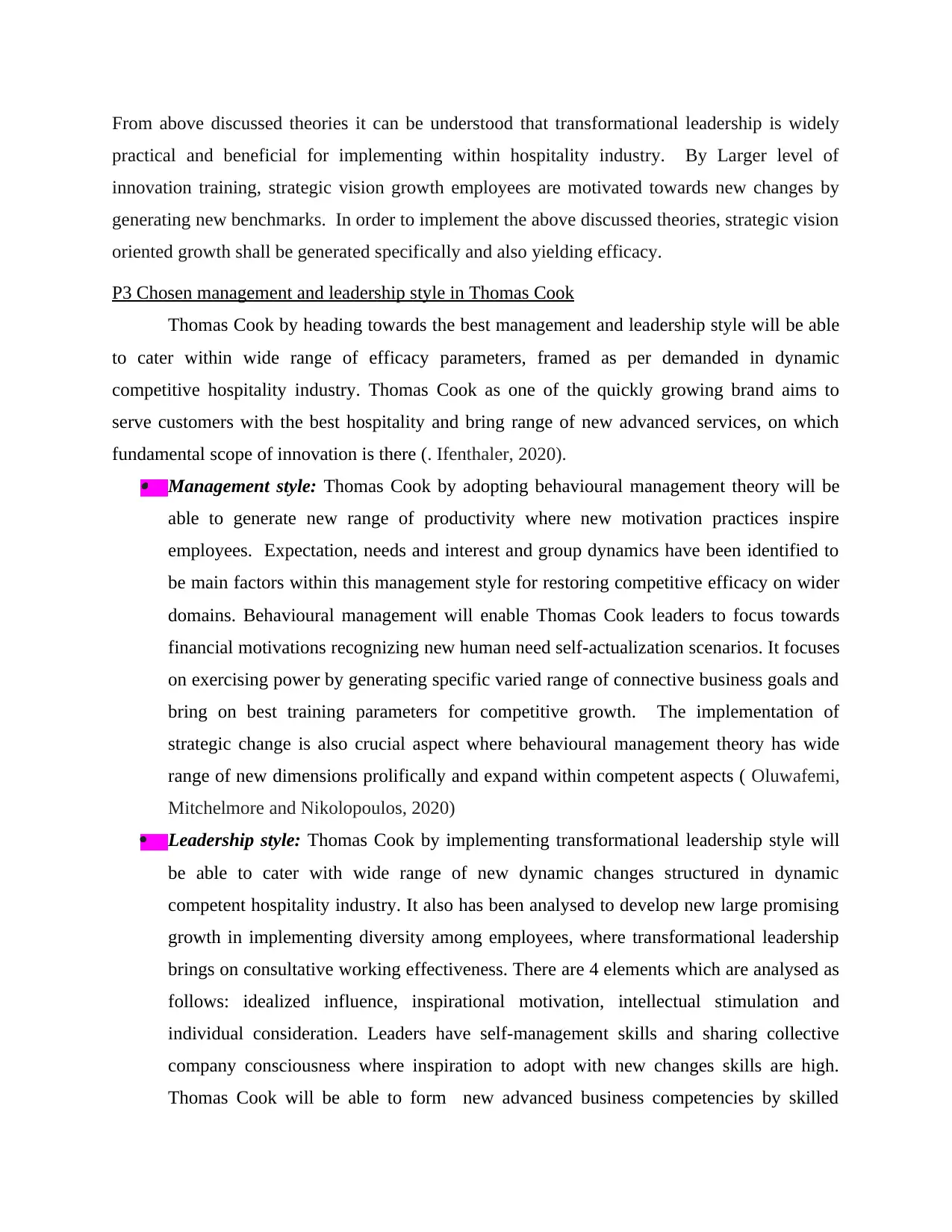
From above discussed theories it can be understood that transformational leadership is widely
practical and beneficial for implementing within hospitality industry. By Larger level of
innovation training, strategic vision growth employees are motivated towards new changes by
generating new benchmarks. In order to implement the above discussed theories, strategic vision
oriented growth shall be generated specifically and also yielding efficacy.
P3 Chosen management and leadership style in Thomas Cook
Thomas Cook by heading towards the best management and leadership style will be able
to cater within wide range of efficacy parameters, framed as per demanded in dynamic
competitive hospitality industry. Thomas Cook as one of the quickly growing brand aims to
serve customers with the best hospitality and bring range of new advanced services, on which
fundamental scope of innovation is there (. Ifenthaler, 2020). Management style: Thomas Cook by adopting behavioural management theory will be
able to generate new range of productivity where new motivation practices inspire
employees. Expectation, needs and interest and group dynamics have been identified to
be main factors within this management style for restoring competitive efficacy on wider
domains. Behavioural management will enable Thomas Cook leaders to focus towards
financial motivations recognizing new human need self-actualization scenarios. It focuses
on exercising power by generating specific varied range of connective business goals and
bring on best training parameters for competitive growth. The implementation of
strategic change is also crucial aspect where behavioural management theory has wide
range of new dimensions prolifically and expand within competent aspects ( Oluwafemi,
Mitchelmore and Nikolopoulos, 2020)
Leadership style: Thomas Cook by implementing transformational leadership style will
be able to cater with wide range of new dynamic changes structured in dynamic
competent hospitality industry. It also has been analysed to develop new large promising
growth in implementing diversity among employees, where transformational leadership
brings on consultative working effectiveness. There are 4 elements which are analysed as
follows: idealized influence, inspirational motivation, intellectual stimulation and
individual consideration. Leaders have self-management skills and sharing collective
company consciousness where inspiration to adopt with new changes skills are high.
Thomas Cook will be able to form new advanced business competencies by skilled
practical and beneficial for implementing within hospitality industry. By Larger level of
innovation training, strategic vision growth employees are motivated towards new changes by
generating new benchmarks. In order to implement the above discussed theories, strategic vision
oriented growth shall be generated specifically and also yielding efficacy.
P3 Chosen management and leadership style in Thomas Cook
Thomas Cook by heading towards the best management and leadership style will be able
to cater within wide range of efficacy parameters, framed as per demanded in dynamic
competitive hospitality industry. Thomas Cook as one of the quickly growing brand aims to
serve customers with the best hospitality and bring range of new advanced services, on which
fundamental scope of innovation is there (. Ifenthaler, 2020). Management style: Thomas Cook by adopting behavioural management theory will be
able to generate new range of productivity where new motivation practices inspire
employees. Expectation, needs and interest and group dynamics have been identified to
be main factors within this management style for restoring competitive efficacy on wider
domains. Behavioural management will enable Thomas Cook leaders to focus towards
financial motivations recognizing new human need self-actualization scenarios. It focuses
on exercising power by generating specific varied range of connective business goals and
bring on best training parameters for competitive growth. The implementation of
strategic change is also crucial aspect where behavioural management theory has wide
range of new dimensions prolifically and expand within competent aspects ( Oluwafemi,
Mitchelmore and Nikolopoulos, 2020)
Leadership style: Thomas Cook by implementing transformational leadership style will
be able to cater with wide range of new dynamic changes structured in dynamic
competent hospitality industry. It also has been analysed to develop new large promising
growth in implementing diversity among employees, where transformational leadership
brings on consultative working effectiveness. There are 4 elements which are analysed as
follows: idealized influence, inspirational motivation, intellectual stimulation and
individual consideration. Leaders have self-management skills and sharing collective
company consciousness where inspiration to adopt with new changes skills are high.
Thomas Cook will be able to form new advanced business competencies by skilled
⊘ This is a preview!⊘
Do you want full access?
Subscribe today to unlock all pages.

Trusted by 1+ million students worldwide
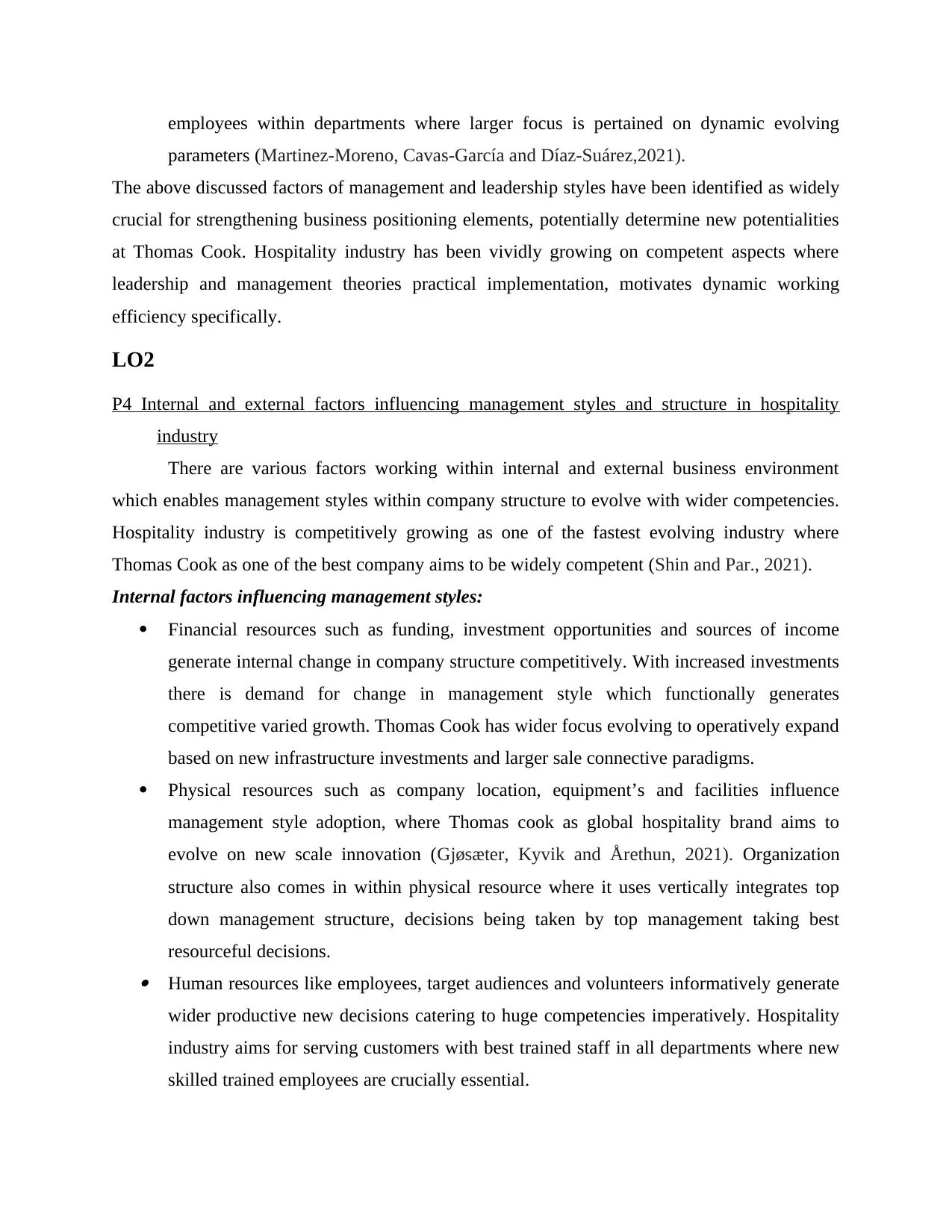
employees within departments where larger focus is pertained on dynamic evolving
parameters (Martinez-Moreno, Cavas-García and Díaz-Suárez,2021).
The above discussed factors of management and leadership styles have been identified as widely
crucial for strengthening business positioning elements, potentially determine new potentialities
at Thomas Cook. Hospitality industry has been vividly growing on competent aspects where
leadership and management theories practical implementation, motivates dynamic working
efficiency specifically.
LO2
P4 Internal and external factors influencing management styles and structure in hospitality
industry
There are various factors working within internal and external business environment
which enables management styles within company structure to evolve with wider competencies.
Hospitality industry is competitively growing as one of the fastest evolving industry where
Thomas Cook as one of the best company aims to be widely competent (Shin and Par., 2021).
Internal factors influencing management styles:
Financial resources such as funding, investment opportunities and sources of income
generate internal change in company structure competitively. With increased investments
there is demand for change in management style which functionally generates
competitive varied growth. Thomas Cook has wider focus evolving to operatively expand
based on new infrastructure investments and larger sale connective paradigms.
Physical resources such as company location, equipment’s and facilities influence
management style adoption, where Thomas cook as global hospitality brand aims to
evolve on new scale innovation (Gjøsæter, Kyvik and Årethun, 2021). Organization
structure also comes in within physical resource where it uses vertically integrates top
down management structure, decisions being taken by top management taking best
resourceful decisions. Human resources like employees, target audiences and volunteers informatively generate
wider productive new decisions catering to huge competencies imperatively. Hospitality
industry aims for serving customers with best trained staff in all departments where new
skilled trained employees are crucially essential.
parameters (Martinez-Moreno, Cavas-García and Díaz-Suárez,2021).
The above discussed factors of management and leadership styles have been identified as widely
crucial for strengthening business positioning elements, potentially determine new potentialities
at Thomas Cook. Hospitality industry has been vividly growing on competent aspects where
leadership and management theories practical implementation, motivates dynamic working
efficiency specifically.
LO2
P4 Internal and external factors influencing management styles and structure in hospitality
industry
There are various factors working within internal and external business environment
which enables management styles within company structure to evolve with wider competencies.
Hospitality industry is competitively growing as one of the fastest evolving industry where
Thomas Cook as one of the best company aims to be widely competent (Shin and Par., 2021).
Internal factors influencing management styles:
Financial resources such as funding, investment opportunities and sources of income
generate internal change in company structure competitively. With increased investments
there is demand for change in management style which functionally generates
competitive varied growth. Thomas Cook has wider focus evolving to operatively expand
based on new infrastructure investments and larger sale connective paradigms.
Physical resources such as company location, equipment’s and facilities influence
management style adoption, where Thomas cook as global hospitality brand aims to
evolve on new scale innovation (Gjøsæter, Kyvik and Årethun, 2021). Organization
structure also comes in within physical resource where it uses vertically integrates top
down management structure, decisions being taken by top management taking best
resourceful decisions. Human resources like employees, target audiences and volunteers informatively generate
wider productive new decisions catering to huge competencies imperatively. Hospitality
industry aims for serving customers with best trained staff in all departments where new
skilled trained employees are crucially essential.
Paraphrase This Document
Need a fresh take? Get an instant paraphrase of this document with our AI Paraphraser
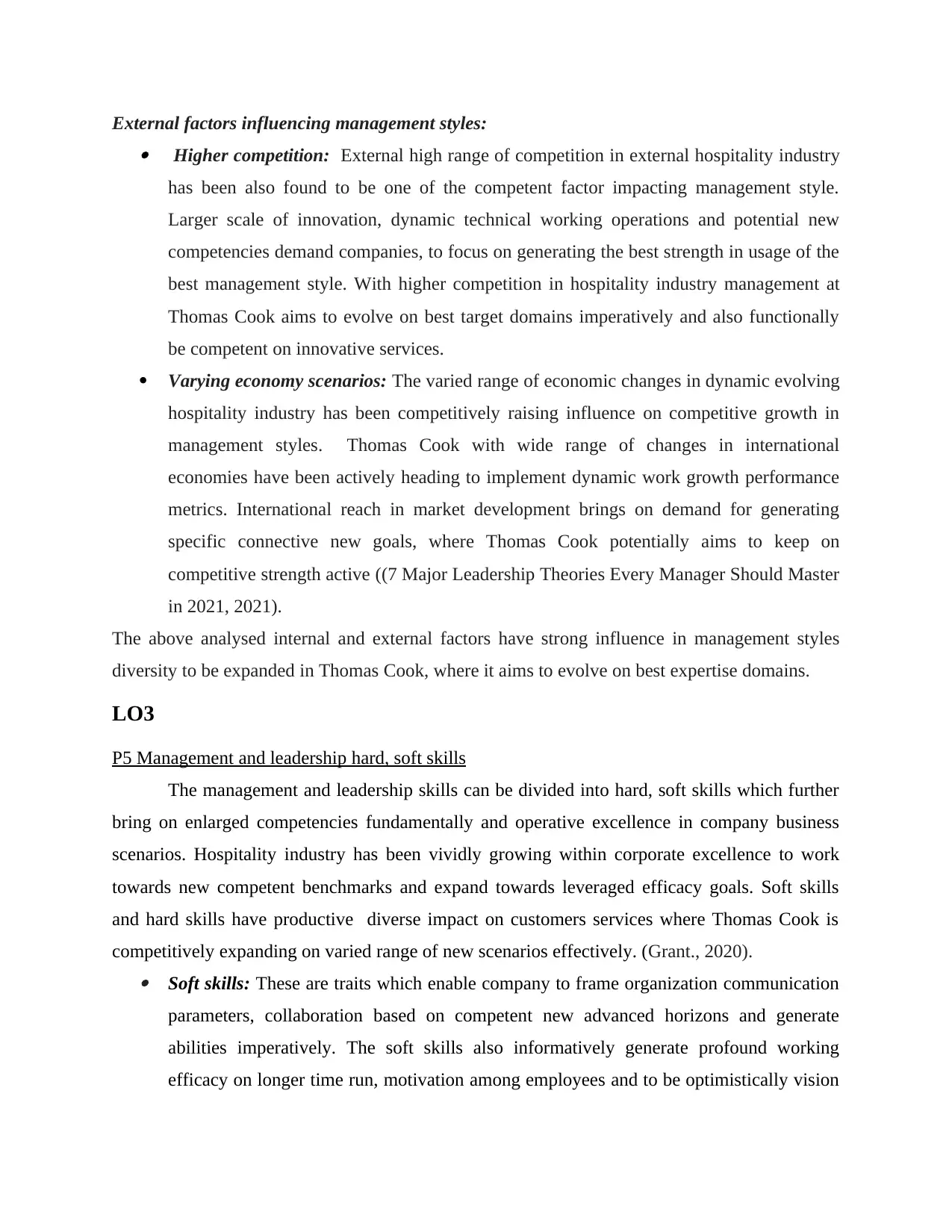
External factors influencing management styles: Higher competition: External high range of competition in external hospitality industry
has been also found to be one of the competent factor impacting management style.
Larger scale of innovation, dynamic technical working operations and potential new
competencies demand companies, to focus on generating the best strength in usage of the
best management style. With higher competition in hospitality industry management at
Thomas Cook aims to evolve on best target domains imperatively and also functionally
be competent on innovative services.
Varying economy scenarios: The varied range of economic changes in dynamic evolving
hospitality industry has been competitively raising influence on competitive growth in
management styles. Thomas Cook with wide range of changes in international
economies have been actively heading to implement dynamic work growth performance
metrics. International reach in market development brings on demand for generating
specific connective new goals, where Thomas Cook potentially aims to keep on
competitive strength active ((7 Major Leadership Theories Every Manager Should Master
in 2021, 2021).
The above analysed internal and external factors have strong influence in management styles
diversity to be expanded in Thomas Cook, where it aims to evolve on best expertise domains.
LO3
P5 Management and leadership hard, soft skills
The management and leadership skills can be divided into hard, soft skills which further
bring on enlarged competencies fundamentally and operative excellence in company business
scenarios. Hospitality industry has been vividly growing within corporate excellence to work
towards new competent benchmarks and expand towards leveraged efficacy goals. Soft skills
and hard skills have productive diverse impact on customers services where Thomas Cook is
competitively expanding on varied range of new scenarios effectively. (Grant., 2020). Soft skills: These are traits which enable company to frame organization communication
parameters, collaboration based on competent new advanced horizons and generate
abilities imperatively. The soft skills also informatively generate profound working
efficacy on longer time run, motivation among employees and to be optimistically vision
has been also found to be one of the competent factor impacting management style.
Larger scale of innovation, dynamic technical working operations and potential new
competencies demand companies, to focus on generating the best strength in usage of the
best management style. With higher competition in hospitality industry management at
Thomas Cook aims to evolve on best target domains imperatively and also functionally
be competent on innovative services.
Varying economy scenarios: The varied range of economic changes in dynamic evolving
hospitality industry has been competitively raising influence on competitive growth in
management styles. Thomas Cook with wide range of changes in international
economies have been actively heading to implement dynamic work growth performance
metrics. International reach in market development brings on demand for generating
specific connective new goals, where Thomas Cook potentially aims to keep on
competitive strength active ((7 Major Leadership Theories Every Manager Should Master
in 2021, 2021).
The above analysed internal and external factors have strong influence in management styles
diversity to be expanded in Thomas Cook, where it aims to evolve on best expertise domains.
LO3
P5 Management and leadership hard, soft skills
The management and leadership skills can be divided into hard, soft skills which further
bring on enlarged competencies fundamentally and operative excellence in company business
scenarios. Hospitality industry has been vividly growing within corporate excellence to work
towards new competent benchmarks and expand towards leveraged efficacy goals. Soft skills
and hard skills have productive diverse impact on customers services where Thomas Cook is
competitively expanding on varied range of new scenarios effectively. (Grant., 2020). Soft skills: These are traits which enable company to frame organization communication
parameters, collaboration based on competent new advanced horizons and generate
abilities imperatively. The soft skills also informatively generate profound working
efficacy on longer time run, motivation among employees and to be optimistically vision
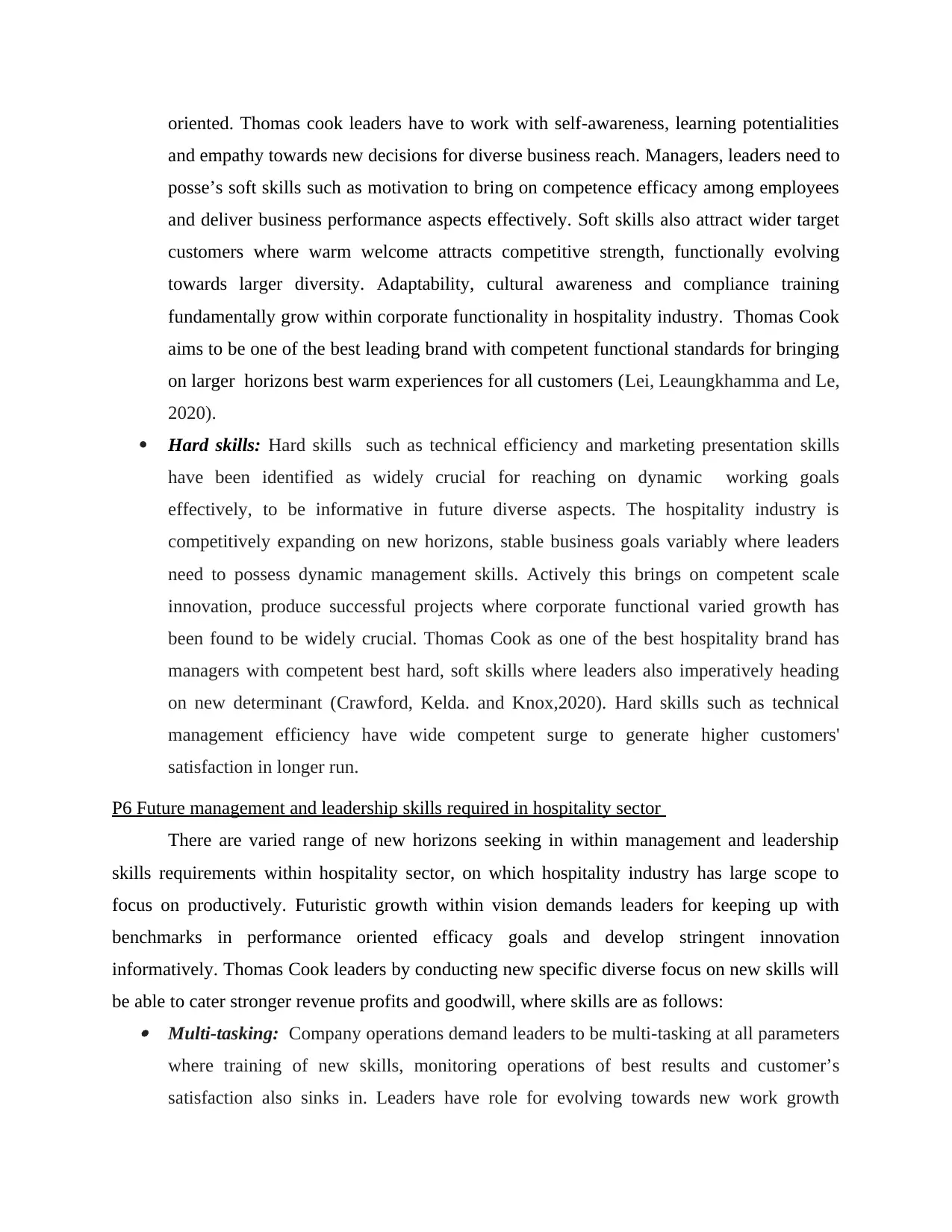
oriented. Thomas cook leaders have to work with self-awareness, learning potentialities
and empathy towards new decisions for diverse business reach. Managers, leaders need to
posse’s soft skills such as motivation to bring on competence efficacy among employees
and deliver business performance aspects effectively. Soft skills also attract wider target
customers where warm welcome attracts competitive strength, functionally evolving
towards larger diversity. Adaptability, cultural awareness and compliance training
fundamentally grow within corporate functionality in hospitality industry. Thomas Cook
aims to be one of the best leading brand with competent functional standards for bringing
on larger horizons best warm experiences for all customers (Lei, Leaungkhamma and Le,
2020).
Hard skills: Hard skills such as technical efficiency and marketing presentation skills
have been identified as widely crucial for reaching on dynamic working goals
effectively, to be informative in future diverse aspects. The hospitality industry is
competitively expanding on new horizons, stable business goals variably where leaders
need to possess dynamic management skills. Actively this brings on competent scale
innovation, produce successful projects where corporate functional varied growth has
been found to be widely crucial. Thomas Cook as one of the best hospitality brand has
managers with competent best hard, soft skills where leaders also imperatively heading
on new determinant (Crawford, Kelda. and Knox,2020). Hard skills such as technical
management efficiency have wide competent surge to generate higher customers'
satisfaction in longer run.
P6 Future management and leadership skills required in hospitality sector
There are varied range of new horizons seeking in within management and leadership
skills requirements within hospitality sector, on which hospitality industry has large scope to
focus on productively. Futuristic growth within vision demands leaders for keeping up with
benchmarks in performance oriented efficacy goals and develop stringent innovation
informatively. Thomas Cook leaders by conducting new specific diverse focus on new skills will
be able to cater stronger revenue profits and goodwill, where skills are as follows: Multi-tasking: Company operations demand leaders to be multi-tasking at all parameters
where training of new skills, monitoring operations of best results and customer’s
satisfaction also sinks in. Leaders have role for evolving towards new work growth
and empathy towards new decisions for diverse business reach. Managers, leaders need to
posse’s soft skills such as motivation to bring on competence efficacy among employees
and deliver business performance aspects effectively. Soft skills also attract wider target
customers where warm welcome attracts competitive strength, functionally evolving
towards larger diversity. Adaptability, cultural awareness and compliance training
fundamentally grow within corporate functionality in hospitality industry. Thomas Cook
aims to be one of the best leading brand with competent functional standards for bringing
on larger horizons best warm experiences for all customers (Lei, Leaungkhamma and Le,
2020).
Hard skills: Hard skills such as technical efficiency and marketing presentation skills
have been identified as widely crucial for reaching on dynamic working goals
effectively, to be informative in future diverse aspects. The hospitality industry is
competitively expanding on new horizons, stable business goals variably where leaders
need to possess dynamic management skills. Actively this brings on competent scale
innovation, produce successful projects where corporate functional varied growth has
been found to be widely crucial. Thomas Cook as one of the best hospitality brand has
managers with competent best hard, soft skills where leaders also imperatively heading
on new determinant (Crawford, Kelda. and Knox,2020). Hard skills such as technical
management efficiency have wide competent surge to generate higher customers'
satisfaction in longer run.
P6 Future management and leadership skills required in hospitality sector
There are varied range of new horizons seeking in within management and leadership
skills requirements within hospitality sector, on which hospitality industry has large scope to
focus on productively. Futuristic growth within vision demands leaders for keeping up with
benchmarks in performance oriented efficacy goals and develop stringent innovation
informatively. Thomas Cook leaders by conducting new specific diverse focus on new skills will
be able to cater stronger revenue profits and goodwill, where skills are as follows: Multi-tasking: Company operations demand leaders to be multi-tasking at all parameters
where training of new skills, monitoring operations of best results and customer’s
satisfaction also sinks in. Leaders have role for evolving towards new work growth
⊘ This is a preview!⊘
Do you want full access?
Subscribe today to unlock all pages.

Trusted by 1+ million students worldwide
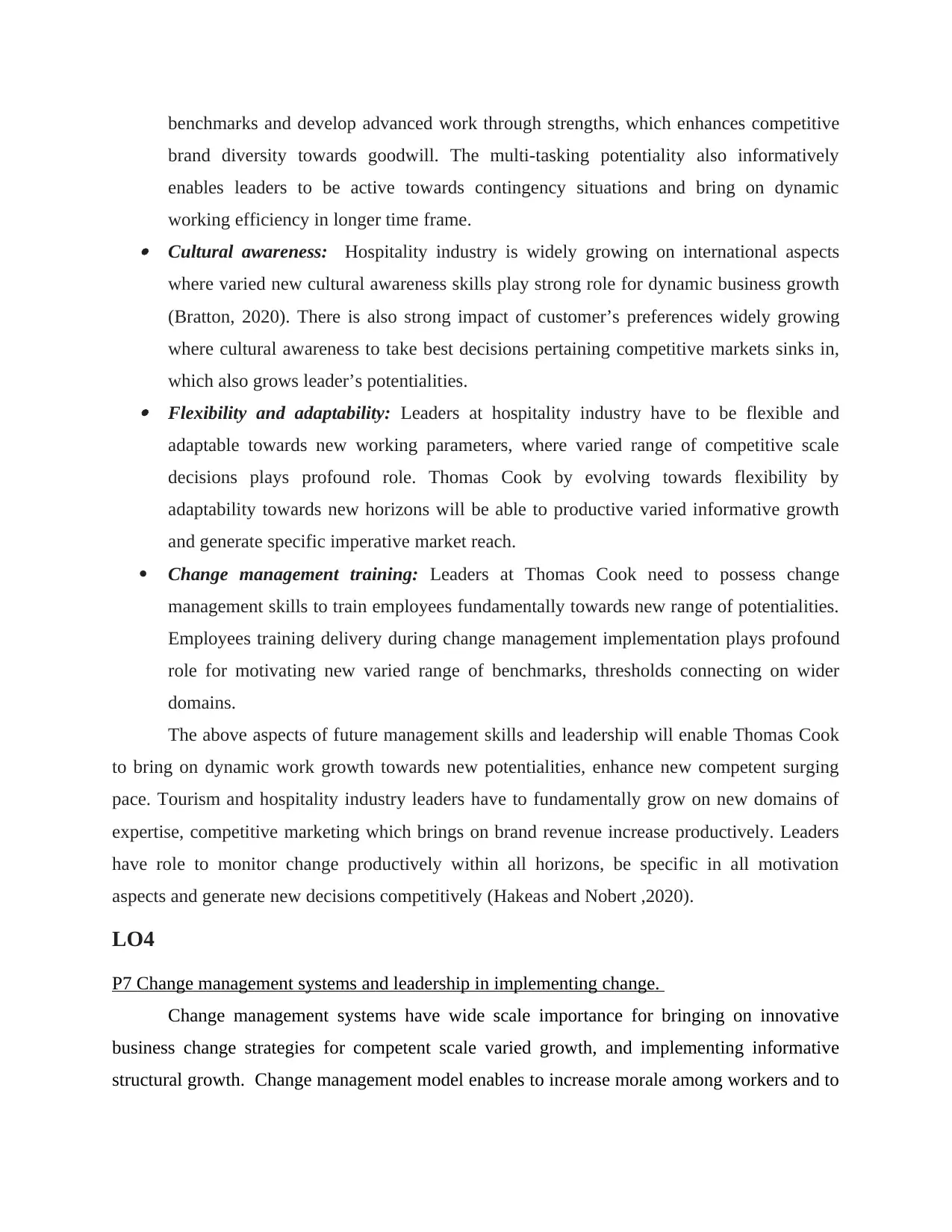
benchmarks and develop advanced work through strengths, which enhances competitive
brand diversity towards goodwill. The multi-tasking potentiality also informatively
enables leaders to be active towards contingency situations and bring on dynamic
working efficiency in longer time frame. Cultural awareness: Hospitality industry is widely growing on international aspects
where varied new cultural awareness skills play strong role for dynamic business growth
(Bratton, 2020). There is also strong impact of customer’s preferences widely growing
where cultural awareness to take best decisions pertaining competitive markets sinks in,
which also grows leader’s potentialities. Flexibility and adaptability: Leaders at hospitality industry have to be flexible and
adaptable towards new working parameters, where varied range of competitive scale
decisions plays profound role. Thomas Cook by evolving towards flexibility by
adaptability towards new horizons will be able to productive varied informative growth
and generate specific imperative market reach.
Change management training: Leaders at Thomas Cook need to possess change
management skills to train employees fundamentally towards new range of potentialities.
Employees training delivery during change management implementation plays profound
role for motivating new varied range of benchmarks, thresholds connecting on wider
domains.
The above aspects of future management skills and leadership will enable Thomas Cook
to bring on dynamic work growth towards new potentialities, enhance new competent surging
pace. Tourism and hospitality industry leaders have to fundamentally grow on new domains of
expertise, competitive marketing which brings on brand revenue increase productively. Leaders
have role to monitor change productively within all horizons, be specific in all motivation
aspects and generate new decisions competitively (Hakeas and Nobert ,2020).
LO4
P7 Change management systems and leadership in implementing change.
Change management systems have wide scale importance for bringing on innovative
business change strategies for competent scale varied growth, and implementing informative
structural growth. Change management model enables to increase morale among workers and to
brand diversity towards goodwill. The multi-tasking potentiality also informatively
enables leaders to be active towards contingency situations and bring on dynamic
working efficiency in longer time frame. Cultural awareness: Hospitality industry is widely growing on international aspects
where varied new cultural awareness skills play strong role for dynamic business growth
(Bratton, 2020). There is also strong impact of customer’s preferences widely growing
where cultural awareness to take best decisions pertaining competitive markets sinks in,
which also grows leader’s potentialities. Flexibility and adaptability: Leaders at hospitality industry have to be flexible and
adaptable towards new working parameters, where varied range of competitive scale
decisions plays profound role. Thomas Cook by evolving towards flexibility by
adaptability towards new horizons will be able to productive varied informative growth
and generate specific imperative market reach.
Change management training: Leaders at Thomas Cook need to possess change
management skills to train employees fundamentally towards new range of potentialities.
Employees training delivery during change management implementation plays profound
role for motivating new varied range of benchmarks, thresholds connecting on wider
domains.
The above aspects of future management skills and leadership will enable Thomas Cook
to bring on dynamic work growth towards new potentialities, enhance new competent surging
pace. Tourism and hospitality industry leaders have to fundamentally grow on new domains of
expertise, competitive marketing which brings on brand revenue increase productively. Leaders
have role to monitor change productively within all horizons, be specific in all motivation
aspects and generate new decisions competitively (Hakeas and Nobert ,2020).
LO4
P7 Change management systems and leadership in implementing change.
Change management systems have wide scale importance for bringing on innovative
business change strategies for competent scale varied growth, and implementing informative
structural growth. Change management model enables to increase morale among workers and to
Paraphrase This Document
Need a fresh take? Get an instant paraphrase of this document with our AI Paraphraser
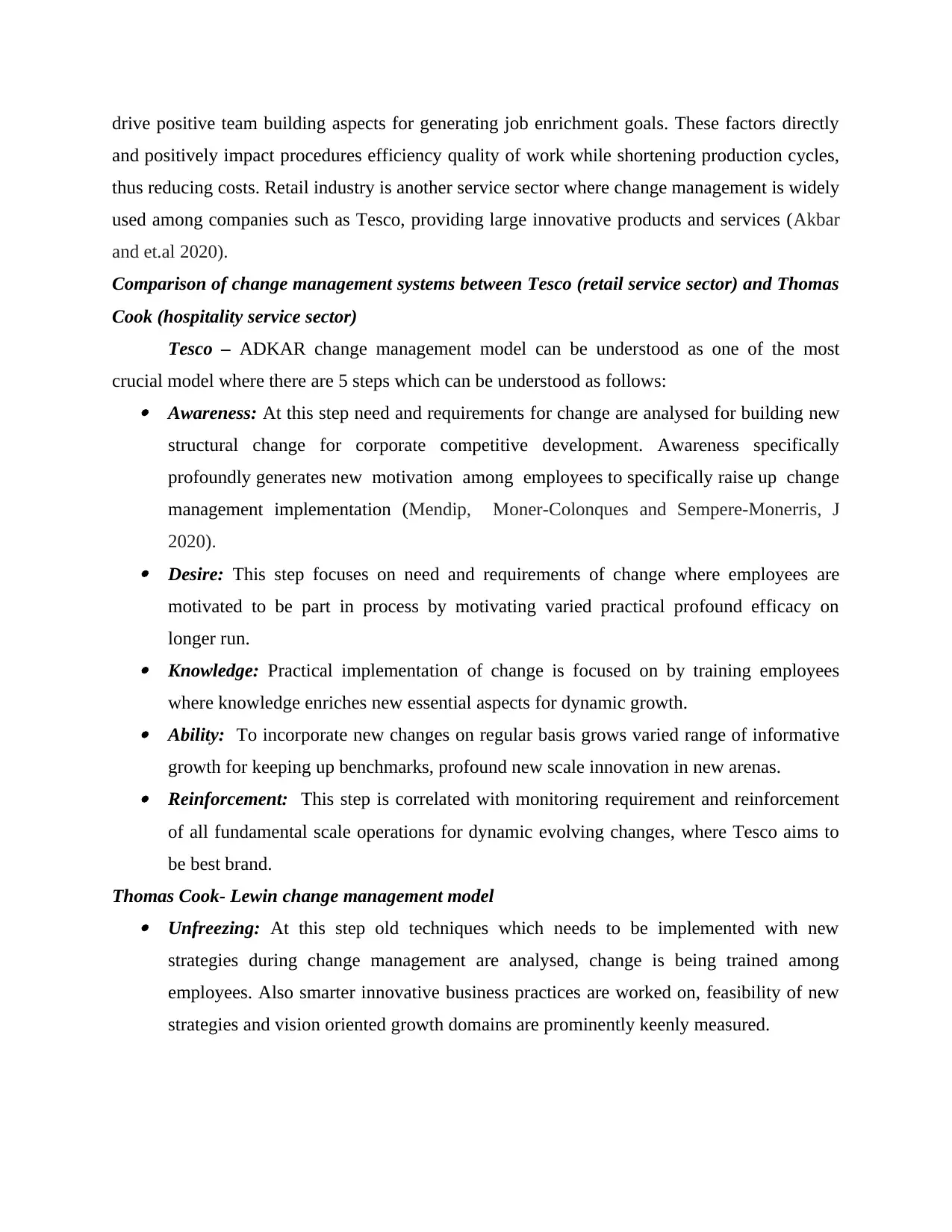
drive positive team building aspects for generating job enrichment goals. These factors directly
and positively impact procedures efficiency quality of work while shortening production cycles,
thus reducing costs. Retail industry is another service sector where change management is widely
used among companies such as Tesco, providing large innovative products and services (Akbar
and et.al 2020).
Comparison of change management systems between Tesco (retail service sector) and Thomas
Cook (hospitality service sector)
Tesco – ADKAR change management model can be understood as one of the most
crucial model where there are 5 steps which can be understood as follows: Awareness: At this step need and requirements for change are analysed for building new
structural change for corporate competitive development. Awareness specifically
profoundly generates new motivation among employees to specifically raise up change
management implementation (Mendip, Moner-Colonques and Sempere-Monerris, J
2020). Desire: This step focuses on need and requirements of change where employees are
motivated to be part in process by motivating varied practical profound efficacy on
longer run. Knowledge: Practical implementation of change is focused on by training employees
where knowledge enriches new essential aspects for dynamic growth. Ability: To incorporate new changes on regular basis grows varied range of informative
growth for keeping up benchmarks, profound new scale innovation in new arenas. Reinforcement: This step is correlated with monitoring requirement and reinforcement
of all fundamental scale operations for dynamic evolving changes, where Tesco aims to
be best brand.
Thomas Cook- Lewin change management model Unfreezing: At this step old techniques which needs to be implemented with new
strategies during change management are analysed, change is being trained among
employees. Also smarter innovative business practices are worked on, feasibility of new
strategies and vision oriented growth domains are prominently keenly measured.
and positively impact procedures efficiency quality of work while shortening production cycles,
thus reducing costs. Retail industry is another service sector where change management is widely
used among companies such as Tesco, providing large innovative products and services (Akbar
and et.al 2020).
Comparison of change management systems between Tesco (retail service sector) and Thomas
Cook (hospitality service sector)
Tesco – ADKAR change management model can be understood as one of the most
crucial model where there are 5 steps which can be understood as follows: Awareness: At this step need and requirements for change are analysed for building new
structural change for corporate competitive development. Awareness specifically
profoundly generates new motivation among employees to specifically raise up change
management implementation (Mendip, Moner-Colonques and Sempere-Monerris, J
2020). Desire: This step focuses on need and requirements of change where employees are
motivated to be part in process by motivating varied practical profound efficacy on
longer run. Knowledge: Practical implementation of change is focused on by training employees
where knowledge enriches new essential aspects for dynamic growth. Ability: To incorporate new changes on regular basis grows varied range of informative
growth for keeping up benchmarks, profound new scale innovation in new arenas. Reinforcement: This step is correlated with monitoring requirement and reinforcement
of all fundamental scale operations for dynamic evolving changes, where Tesco aims to
be best brand.
Thomas Cook- Lewin change management model Unfreezing: At this step old techniques which needs to be implemented with new
strategies during change management are analysed, change is being trained among
employees. Also smarter innovative business practices are worked on, feasibility of new
strategies and vision oriented growth domains are prominently keenly measured.
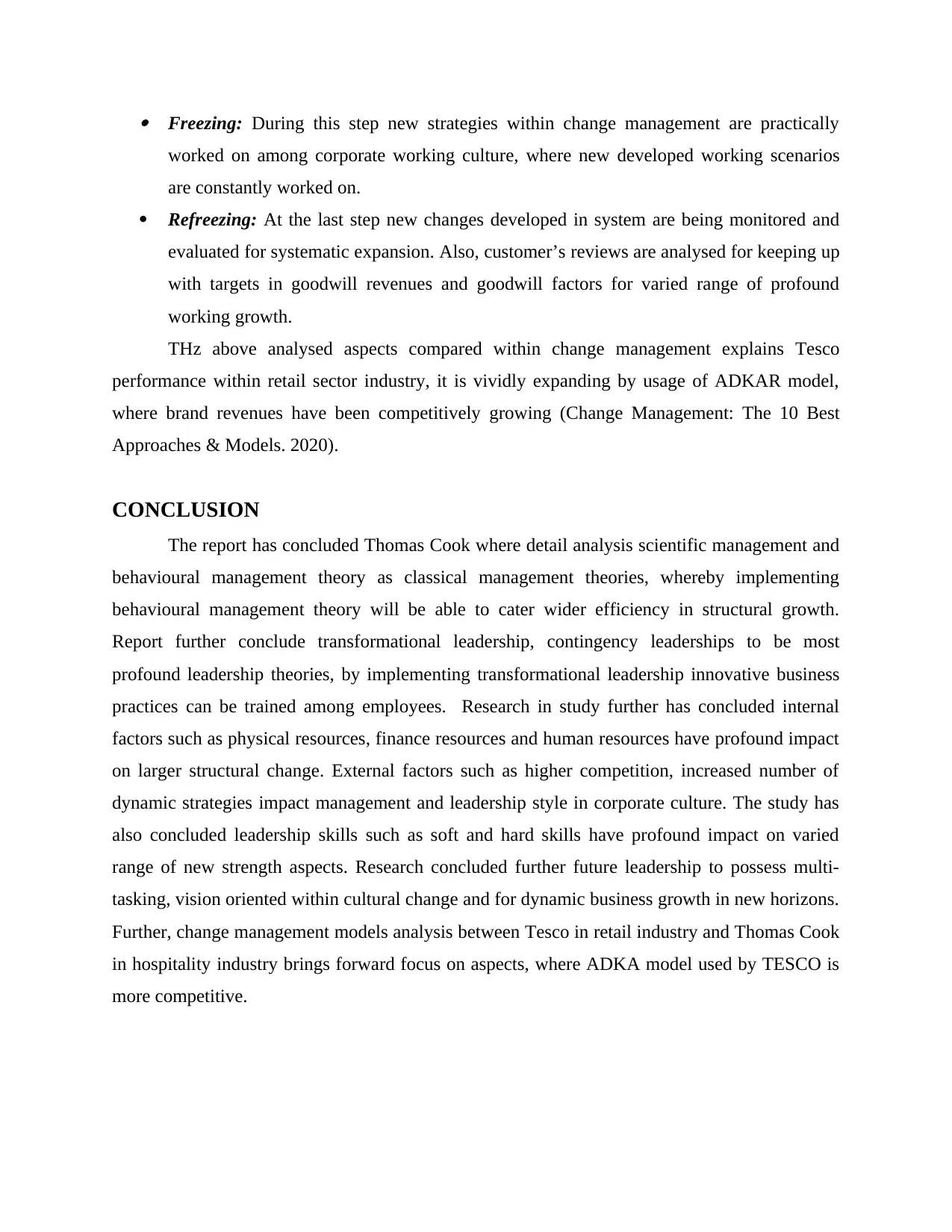
Freezing: During this step new strategies within change management are practically
worked on among corporate working culture, where new developed working scenarios
are constantly worked on.
Refreezing: At the last step new changes developed in system are being monitored and
evaluated for systematic expansion. Also, customer’s reviews are analysed for keeping up
with targets in goodwill revenues and goodwill factors for varied range of profound
working growth.
THz above analysed aspects compared within change management explains Tesco
performance within retail sector industry, it is vividly expanding by usage of ADKAR model,
where brand revenues have been competitively growing (Change Management: The 10 Best
Approaches & Models. 2020).
CONCLUSION
The report has concluded Thomas Cook where detail analysis scientific management and
behavioural management theory as classical management theories, whereby implementing
behavioural management theory will be able to cater wider efficiency in structural growth.
Report further conclude transformational leadership, contingency leaderships to be most
profound leadership theories, by implementing transformational leadership innovative business
practices can be trained among employees. Research in study further has concluded internal
factors such as physical resources, finance resources and human resources have profound impact
on larger structural change. External factors such as higher competition, increased number of
dynamic strategies impact management and leadership style in corporate culture. The study has
also concluded leadership skills such as soft and hard skills have profound impact on varied
range of new strength aspects. Research concluded further future leadership to possess multi-
tasking, vision oriented within cultural change and for dynamic business growth in new horizons.
Further, change management models analysis between Tesco in retail industry and Thomas Cook
in hospitality industry brings forward focus on aspects, where ADKA model used by TESCO is
more competitive.
worked on among corporate working culture, where new developed working scenarios
are constantly worked on.
Refreezing: At the last step new changes developed in system are being monitored and
evaluated for systematic expansion. Also, customer’s reviews are analysed for keeping up
with targets in goodwill revenues and goodwill factors for varied range of profound
working growth.
THz above analysed aspects compared within change management explains Tesco
performance within retail sector industry, it is vividly expanding by usage of ADKAR model,
where brand revenues have been competitively growing (Change Management: The 10 Best
Approaches & Models. 2020).
CONCLUSION
The report has concluded Thomas Cook where detail analysis scientific management and
behavioural management theory as classical management theories, whereby implementing
behavioural management theory will be able to cater wider efficiency in structural growth.
Report further conclude transformational leadership, contingency leaderships to be most
profound leadership theories, by implementing transformational leadership innovative business
practices can be trained among employees. Research in study further has concluded internal
factors such as physical resources, finance resources and human resources have profound impact
on larger structural change. External factors such as higher competition, increased number of
dynamic strategies impact management and leadership style in corporate culture. The study has
also concluded leadership skills such as soft and hard skills have profound impact on varied
range of new strength aspects. Research concluded further future leadership to possess multi-
tasking, vision oriented within cultural change and for dynamic business growth in new horizons.
Further, change management models analysis between Tesco in retail industry and Thomas Cook
in hospitality industry brings forward focus on aspects, where ADKA model used by TESCO is
more competitive.
⊘ This is a preview!⊘
Do you want full access?
Subscribe today to unlock all pages.

Trusted by 1+ million students worldwide
1 out of 14
Related Documents
Your All-in-One AI-Powered Toolkit for Academic Success.
+13062052269
info@desklib.com
Available 24*7 on WhatsApp / Email
![[object Object]](/_next/static/media/star-bottom.7253800d.svg)
Unlock your academic potential
Copyright © 2020–2026 A2Z Services. All Rights Reserved. Developed and managed by ZUCOL.





